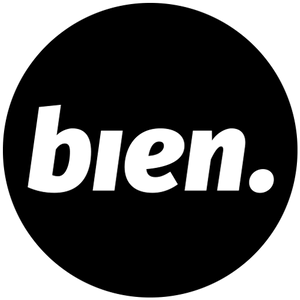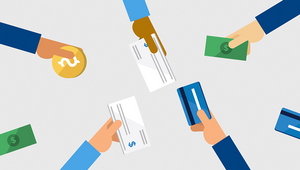
Bossing It: Hung Le on His Mantra, "Don't Be An Asshole"

Hung Le accidentally came into broadcast design after taking the first job at a local TV station in Houston, Texas. From there, he freelanced as a motion designer both onsite and remotely for various studios during the Golden Age of Television. He was never a superstar who won accolades. He was grateful for many opportunities and connections over the years. But at the same time, Hung noticed the need for more mentorship and diversity in the motion design industry.
In 2017, Hung Le and Ricardo Roberts created BIEN, the inclusive motion design studio. As creative director, Hung has one singular leadership goal: to be a mentor and a stepping stone for a more inclusive future.
LBB> What was your first experience of leadership?
Hung> In my previous life as a broadcast design freelancer, I picked up a few direct clients who would ask me to take on the entire project instead of simply designing or animating. With a project rate, I was able to bring on other artists to help. In the process, I learned through trial-and-error how to lead.
LBB> How did you figure out what kind of leader you wanted to be – or what kind of leader you didn’t want to be?
Hung> Through my personal experience working under other directors in the past, it was very apparent what I did not want to become. I always think of my leadership role from the point of view of someone who has to put up with me - what kind of leader should I not be? “Don’t be an asshole” is my mantra.
LBB> What experience or moment gave you your biggest lesson in leadership?
Hung> Up until recently, I often felt the pressure to micro-manage both on the project management side as well as the creative side. My thinking was that everything had to be perfect for a small studio like ours to succeed. That mindset had multiple negative effects on me and the team. I worked longer hours, became way too stressed, and the team did not have the confidence to execute without my sign-off. Learning to let go and to trust our team and our processes has been the most positive experience so far.
LBB> Did you know you always wanted to take on a leadership role? If so how did you work towards it and if not, when did you start realizing that you had it in you?
Hung> I did not set out with a goal of being a boss. My business partner, Ricardo Roberts, and I started BIEN with one singular goal in mind - closing the diversity gap in our industry by creating a studio space where diverse perspectives can thrive and do great work. I learned from Monica H. Kang that it’s better to be a coach than to be a boss.
To me, leadership is a constant journey to learn and refine. I don’t subscribe to the, 'lead from behind' mentality. Leadership is constantly in flux and it has to adapt quickly to the situation at hand. We should lead from behind, the middle, and in front when needed.
LBB> When it comes to 'leadership' as a skill, how much do you think is a natural part of personality, how much can be taught and learned?
Hung> 20% Nature, 80% Nurture. As an introvert, I have always been keen on observation. My cultural background of being an immigrant from Asia contributes to the directness of my communication. I learned to refine my skills to communicate more effectively with our team over time.
My common struggle is how to “keep it real” with our team. Let’s face it. Leadership skills are tested only when things don’t go as planned or when the stakes are high. In those cases, it’s important not to let niceties sugar-coat and downplay the gravity of the situation while, at the same time, not to focus on blame.
LBB> What are the aspects of leadership that you find most personally challenging? And how do you work through them?
Hung> BIEN is THE inclusive motion design studio. We weave inclusive principles into every aspect of our business practice. My challenge is upholding our tenets by being an inclusive leader. I love the DEIA space and am a huge advocate but I prefer a more pragmatic, not idealistic approach to DEIA advocacy. That means I constantly do performance review of my own actions to ensure I stand behind my words.
LBB> Have you ever felt like you've failed whilst in charge? How did you address the issue and what did you learn from it?
Hung> I have failed often when my attention has not been fully committed to the projects I led. And this pattern will continue because it is part of our growing pains. As a studio, we send surveys out to clients and freelancers at the end of each job so I see my rating and feedback per job. I try to be more objective looking at the feedback to see if they are legit concerns that could result in a course correction. Of course, delegating the responsibilities and trusting your team to execute have been steps in the right direction.
LBB> In terms of leadership and openness, what’s your approach there? Do you think it’s important to be as transparent as possible in the service of being authentic? Or is there a value in being careful and considered?
Hung> I love sharing what I know. I’m definitely an over-sharer. Transparency is the cornerstone of our inclusive practice. As a team, we believe in the walk, not the talk. Actions speak louder. In my day-to-day as a creative director, I try not to be cryptic with the producers. I often share production pain points so producers can empathise with the team. Within our close-knit group, I’m a lot more direct. In fact, I know I’m guilty of being too direct sometimes.
LBB> As you developed your leadership skills did you have a mentor, if so who were/are they and what have you learned? And on the flip side, do you mentor any aspiring leaders and how do you approach that relationship?
Hung> I never had a mentor. Everything I know has been through observation and research. This lack of mentorship is the reason why BIEN has many initiatives to bridge the gap. We have scholarships, apprenticeships, and a Fly-on-the-Wall program to help students, juniors, and seniors gain experience in this field. I have mentored a few motion design art directors and creative directors from adjacent fields to motion design. The BIEN approach is simple - What would you like to know? We will show you what we know.
LBB> In continually changing market circumstances, how do you cope with the responsibility of leading a team through difficult waters?
Hung> Ricardo and I always try to be more transparent with the team about market conditions. Like most studios, 2023 was not a great year. We hunkered down and did our best to shield our team from the turbulence while, at the same time, sending enough signals to the rest of the team that we all had to pull extra weight to get through it together. To us, keeping the studio extremely agile is the key to success.
LBB> As a leader, what are some of the ways in which you’ve prioritised diversity and inclusion within your workforce?
Hung> Inclusive Motion Design is a methodology BIEN is built on. Diversity and Inclusion are not checkboxes for us. They are core tenets. We think about DEIA not as part of a project, but part of our business. In practice, this means DEIA measures are considered before, during, and after. We live by the idea of, “designed with, not for.” And our team makeup speaks to that.
LBB> How important is your company culture to the success of your business? And how have you managed to keep it alive with increases in remote and hybrid working patterns?
Hung> BIEN was one of the early adopters of remote working. Our culture is built on the idea of family-first. Our staff is spread across 3 continents on purpose. We lean into their lived experiences to diversify our work. We keep it alive by not forcing people to do what they don’t want. Working at BIEN isn’t just about doing good work only. It’s about playing a role in creating impact to make the future of design more inclusive.
LBB> What are the most useful resources you’ve found to help you along your leadership journey?
Hung> 'The Neuroscience of You' by Dr. Chantel Prat gave me insights on human behaviour and implicit biases. 'Talking to Strangers' by Malcom Gladwell is another great resource for leadership skills. I’m also a podcast junkie. Although I rarely listen to design podcasts. I’m obsessed with organisational psychology and social sciences so, 'WorkLife' and 'Re:Thinking' by Adam Grant are high on my list. 'Hidden Brain' by Shankar Vedantam is a must.
I have applied so many things I learned on these podcasts into our inclusive practices as well as my own leadership style.













